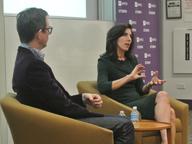Faculty News
—
Professor Robert Engle's research with Stern's Volatility Institute on systemic risk in South African banks is featured
—

Excerpt from Moneyweb -- "A monthly analysis by Engle and the Volatility Institute at New York University’s Stern School of Business ranks the systemic risk contribution (SRISK%) of a number of South African banks and financial services companies higher than the riskiest European banks."
Faculty News
—

Excerpt from Moneyweb -- "A monthly analysis by Engle and the Volatility Institute at New York University’s Stern School of Business ranks the systemic risk contribution (SRISK%) of a number of South African banks and financial services companies higher than the riskiest European banks."























